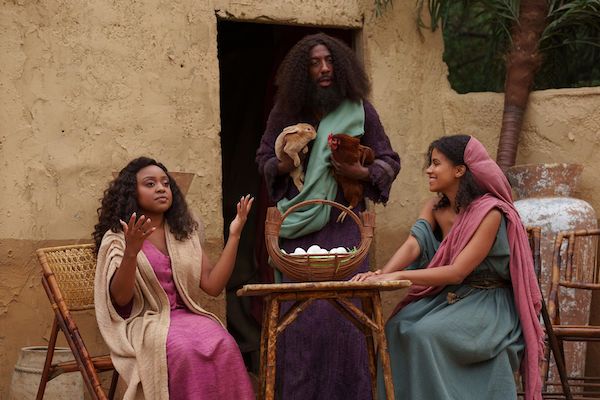Television Review: “History of the World, Part II” — D Grade “History”
By Jason M. Rubin
Hulu’s History of the World, Part II — the damn thing isn’t funny.

Quinta Brunson, J.B. Smoove, and Zazie Beetz in History of the World, Part II. Photo: Hulu
I couldn’t do it. I couldn’t take it anymore. Halfway through Hulu’s four-night rollout of History of the World, Part II, which began on March 6, I had to stop. The damn thing just wasn’t funny. Understand, I consider History of the World, Part I to be not only Mel Brooks’ funniest movie, but one of the funniest movies of all time. Essentially a sketch film, it was Brooks at his best, riffing on a wide range of historical epochs in his usual punning, scatological, and anachronistic style. But it was diverse (a Las Vegas-y musical number about the Spanish Inquisition contrasted with a lengthy sketch about the Roman Empire that deftly tied in stand-up comedy, slavery, marijuana, and the Last Supper) and most important, it was FUNNY.
It was also made 42 years ago. Why now, then, is there a sequel? Don’t ask Mel; other than serving as narrator (a role given to Orson Welles in the original) he’s barely involved in Part II. If you bother to watch the credits at the end of each interminable 25-minute episode, you’ll see this was the result of a committee of writers and producers, and you’ll know why they don’t build statues of committees.
The name (and face) (and voice) we see and hear far too much of is that of comedian Nick Kroll, one of the many writers and producers responsible for this dreck. While I think he’s a pretty good comic, Kroll doesn’t have the heft to legitimately claim this mantle and get all Seth MacFarlane about it. He makes his way into a majority of the sketches and he’s annoying in every one of them (even more so the more Jewish his character is).
And that’s the biggest problem: this really isn’t a Mel Brooks production. Nor is it really a sequel to Part I. It feels like it was intended to be a tribute to the original, but the effort comes off as more of a parody of it. I don’t like the approach taken of cutting each historical epoch into sections, as if each is an epic miniseries. And why play fast and loose with chronology (a bit on Noah’s Ark comes after the umpteenth chapter burlesquing the Russian Revolution)? I also thought some of the more topical references (such as comments on today’s sociopolitical climate during a segment called “Hitler on Ice”) were way too obvious. Why try to throw a punch when a fillip would do? No one ever accused Mel Brooks of being subtle, but Kroll and company use a sledgehammer to pound in every joke (even a fairly spot-on reference to Zero Mostel and Gene Wilder in Brooks’s The Producers, which, though accurately portrayed by Kroll, had nothing to do with the sketch it appeared in).
One of the few funny bits for me was a D-Day pukefest, clearly a nod to the famous fart scene in Brooks’s brilliant Blazing Saddles. Soldiers preparing to disembark on Omaha Beach begin vomiting one after the other. The comedy comes when the conceit passes the threshold (as surely it does) from gross to ridiculous. The daring is that those who are upchucking are American heroes — many of whom perished in seconds after they reached their destination. More of that kind of creative chutzpah would have served this TV series well.
To me, History of the World, Part II is like the Farrelly brothers’ 2012 Three Stooges movie: interesting in concept but terrible in execution. Even if it was more of a legitimate Mel Brooks film, the sad fact is that he hasn’t made a good one since Part I. Spaceballs was dumb, Life Stinks was even worse. He wisely turned The Producers into a cash cow, adapting it for Broadway and spawning a film based on the play.
I was looking forward to Part II but with cautious optimism. As I watched, I soon became even more cautious and even less optimistic. For all I know, the best comedy was saved for the latter half of Part II. I’ll never know because I couldn’t stand to hear Kroll’s New-York-Jew whine and all the jokes that weren’t even really jokes, just parodies of old material weaving in current cultural touchpoints Yawn. I give this History a D.
Jason M. Rubin has been a professional writer for more than 35 years, the last 20 as senior creative associate at Libretto Inc., a Boston-based strategic communications agency where he has won awards for his copywriting. He has written for Arts Fuse since 2012. Jason’s first novel, The Grave & The Gay, based on a 17th-century English folk ballad, was published in September 2012. His current book, Ancient Tales Newly Told, released in March 2019, includes an updated version of his first novel along with a new work of historical fiction, King of Kings, about King Solomon and the Queen of Sheba. Jason is a member of the New England Indie Authors Collective and holds a BA in Journalism from the University of Massachusetts Amherst.
